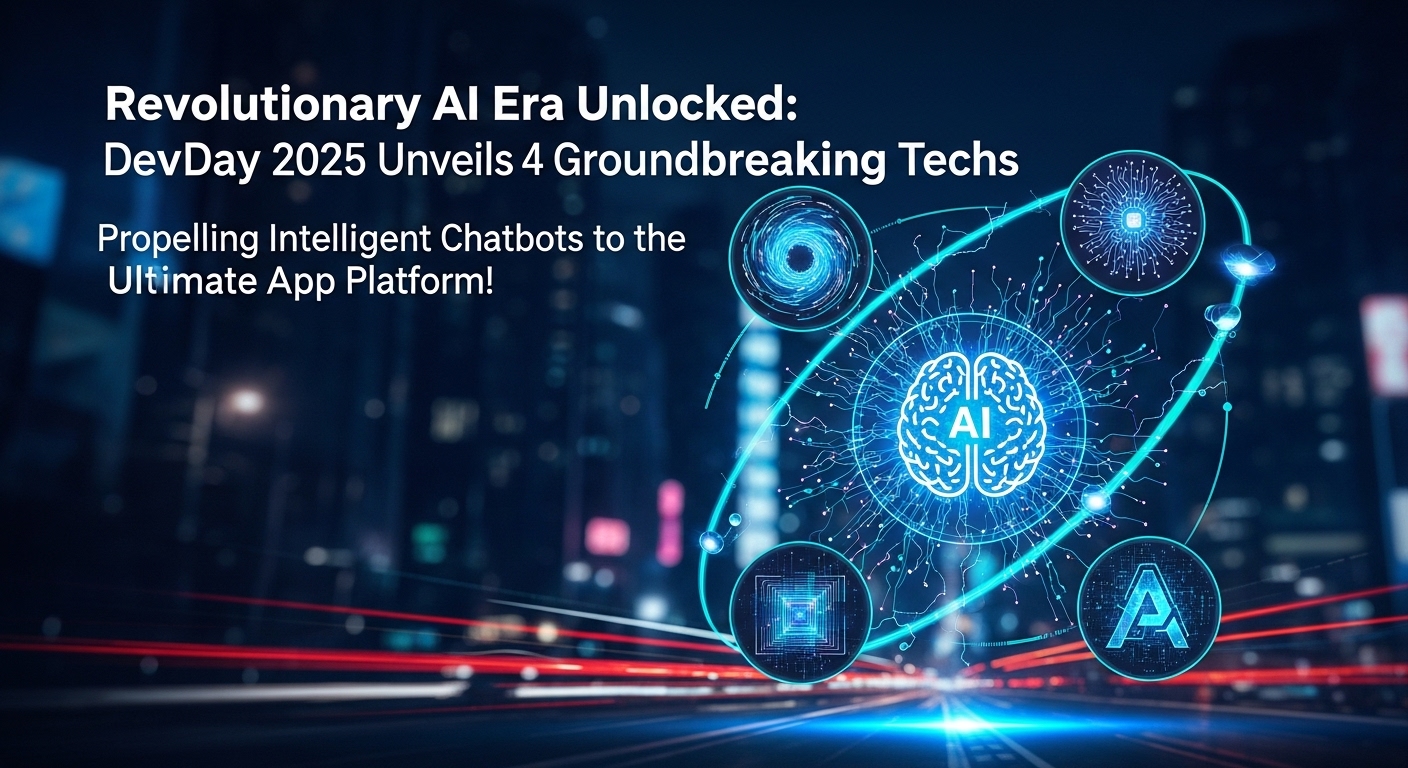ChatGPTが「アプリのOS」へ大変貌!OpenAI DevDay 2025で発表された4つの革新技術を徹底解説
2025年10月6日(現地時間)、米サンフランシスコで開催されたOpenAIの年次開発者会議「DevDay 2025」は、AI業界に再び激震をもたらしました。サム・アルトマンCEOの基調講演では、ChatGPTが単なる強力なチャットボットから、あらゆるサービスを統合する「アプリプラットフォーム」へと進化を遂げる未来が鮮明に提示されたのです。週間アクティブユーザー数が8億人を突破したChatGPTは、その広大なユーザーベースを基盤に、まさにAI時代の新たな「OS」としての地位を確立しようとしています。
今回のDevDayで発表された4つの主要な技術革新は、開発者だけでなく、ビジネス、そして私たちの日常生活にまで計り知れない影響を与えるでしょう。本記事では、この歴史的なイベントで披露された最新技術の詳細と、それがもたらす未来の可能性について深く掘り下げていきます。
1. Apps SDKとApps in ChatGPT:対話型アプリケーションの新時代
最も注目すべき発表の一つが、ChatGPT内でサードパーティ製アプリを直接利用できる新機能「Apps in ChatGPT」と、その開発を可能にする「Apps SDK」のプレビュー版の公開です。 これまでChatGPTで得たアイデアを別のツールで実行するには、タブやアプリを切り替える必要がありました。しかし、「Apps in ChatGPT」の登場により、ユーザーはChatGPTとの対話を中断することなく、チャット画面上で外部サービスを呼び出し、対話を通じてアプリを利用するという画期的なAI体験が可能になります。
例えば、「Zillowでピッツバーグのペット可の家を探して」と入力すれば、チャット内にZillowの不動産検索画面がインライン表示され、画面を切り替えることなく物件の閲覧や問い合わせまで完結できます。 また、「Canvaで明るくポップなポスターを作って」といった自然言語での指示だけで、ChatGPTがCanvaアプリに指示を伝え、ユーザーが細かい操作をすることなく自動でポスターが作成されるデモも披露されました。 この機能は、Model Context Protocol(MCP)をベースとしたオープンスタンダードとして設計されており、開発者は既存サービスとのスムーズな連携や、将来的な直接決済システム(Commerce Protocol)の導入も期待できます。
2. AgentKit:ノーコードでAIエージェントを構築する革新
AIエージェントの開発が、かつてないほど手軽になる「AgentKit」も発表されました。 AgentKitは、複雑なコーディング知識がなくてもビジュアルなワークフロービルダーを通じて強力なAIエージェントを構築できる包括的なツールセットです。主要な構成要素として、ドラッグ&ドロップでワークフローを設計できる「Agent Builder」、ブランドカスタマイズ可能なチャットインターフェースを提供する「ChatKit」、エージェントの性能測定と最適化ツール「Evals for Agents」、そして内部システムや外部サービスとの安全な連携を可能にする「Connector Registry」が含まれます。
ライブデモでは、わずか8分でDevDayウェブサイト用のAIアシスタントを完成させる様子が披露され、セッション情報検索から一般的な問い合わせ対応まで、複雑なワークフローがビジュアルインターフェースだけで実装できることが示されました。 この革新は、AI開発のアクセシビリティを劇的に向上させ、専門知識がない個人開発者でも強力なアプリケーションを数分で作成できる時代を到来させます。
3. Codexの正式公開:AI駆動型ソフトウェア開発の加速
以前から開発者の間で注目されていたコーディング支援AI「Codex」が、ついに一般提供(GA)を開始しました。 この巨大な知性は、プレビュー版の段階で既に40兆トークン以上のコードを処理しており、遂に開発現場の「正式な一員」として加わることになります。 特に強化された「GPT-5 Codexモデル」 は、大幅な性能向上を果たし、チーム開発に特化した新機能群も提供されます。これにより、プログラミング知識が不要化され、数ヶ月かかっていた作業が数分で完了するスピードの革新が実現します。
Codexの正式公開は、ソフトウェア開発のパラダイムを根本的に転換させる可能性を秘めています。開発者は反復的なコーディング作業から解放され、より創造的なアイデアとシステム設計に集中できるようになるでしょう。
4. 新API群の公開:GPT-5 Pro, Sora 2, GPT Realtime Mini
OpenAIは、既存モデルの進化だけでなく、新たに強力なAPI群を公開し、開発者エコシステムをさらに拡大します。
- GPT-5 Pro:APIで正式使用可能になったOpenAIの最も知的なモデルであり、金融、法務、医療など高度な正確性が要求される分野に特化しています。 より多くの計算リソースを使用して深く思考し、一貫して優れた回答を提供します。
- Sora 2:テキストや画像から高品質な動画を生成するAI「Sora」の次世代モデル「Sora 2」が、APIを通じて提供開始されました。 従来のSoraでは映像のみの生成でしたが、Sora 2では登場人物のセリフや環境音、BGMなども同時に生成可能になり、音声と映像の完全同期を実現します。
- GPT Realtime Mini:既存の高級音声モデルと比較して70%安い価格で同じ品質の音声処理能力を提供する、小型で安価な音声モデルがAPIで公開されました。 低遅延での音声処理と自然な対話の実現により、リアルタイム音声インタラクションが日常化する未来を早めます。
まとめ:AI開発の黄金時代へ
OpenAI DevDay 2025は、単なる技術発表に留まらず、AI開発のパラダイムが根本的に転換したことを告げるシグナルでした。 「Apps SDK」によるChatGPTのアプリプラットフォーム化、「AgentKit」によるAIエージェント開発の民主化、「Codex」によるコーディング支援の進化、そして「GPT-5 Pro」「Sora 2」「GPT Realtime Mini」といった次世代モデルのAPI提供は、AIが私たちの生活や仕事に「不可分な存在」として溶け込んでいく未来を、一気に現実レベルまで引き上げました。
これにより、専門的な開発知識がなくても強力なアプリケーションが開発できるようになり、数ヶ月かかっていた作業が数分で完了する「スピードの革新」が実現します。 個人開発者も数億人規模のChatGPTユーザーに即座にサービスを配布できるようになる「規模の民主化」も大きな変化です。 私たちは今、AI開発の黄金時代へと突入しています。OpenAIが描く「対話型OS」としてのChatGPTの未来に、目が離せません。
Revolutionary AI Era Unlocked: OpenAI DevDay 2025 Unveils 4 Groundbreaking Techs, Propelling ChatGPT to the Ultimate App Platform!
The future of artificial intelligence isn’t just arriving; it’s accelerating at an unprecedented pace, and OpenAI’s DevDay 2025 just served as the most definitive proof yet. In a keynote address that sent ripples across the tech world, OpenAI unveiled four pivotal new technologies, effectively transforming ChatGPT from a powerful conversational AI into a robust, extensible application platform. This paradigm shift empowers developers to build, deploy, and monetize AI-powered experiences like never before, opening up an era of truly intelligent applications.
For years, the promise of AI has been to seamlessly integrate into our lives, enhancing productivity and sparking innovation. DevDay 2025 marks the moment that promise takes a monumental leap towards becoming a tangible reality. Let’s dive into the four groundbreaking announcements that are set to redefine the digital landscape.
1. GPT-5: The Core Intelligence Engine with Enhanced Multimodality and Reasoning
At the heart of OpenAI’s new vision is the next-generation foundational model, GPT-5. Far beyond its predecessors, GPT-5 introduces unprecedented levels of reasoning, contextual understanding, and — crucially — advanced multimodal capabilities. Developers can now leverage GPT-5 not just for text and image generation, but for sophisticated video analysis, real-time audio interpretation, and even a nascent understanding of physical world interactions via sensor data. This leap in multimodal reasoning allows AI applications to perceive and interact with the world in a far more human-like manner, paving the way for truly intelligent agents and immersive experiences. Imagine an AI that doesn’t just describe a video but understands the emotional nuances of the actors or an AI that can troubleshoot complex machinery by listening to its operational sounds and analyzing visual cues simultaneously.
2. The “Canvas” Developer Framework: Building AI-Native Apps with Unprecedented Ease
Recognizing the growing demand for AI-first applications, OpenAI introduced “Canvas,” a revolutionary new developer framework designed to streamline the creation of complex AI workflows. Canvas isn’t just an API; it’s a comprehensive suite of tools, libraries, and pre-built components that allows developers to visually design and orchestrate multi-agent AI systems. With drag-and-drop interfaces, intelligent code generation, and robust debugging tools, Canvas drastically reduces the barrier to entry for building sophisticated AI applications. This framework promises to democratize AI development, enabling even those with limited machine learning expertise to craft powerful, bespoke solutions. It offers seamless integration with existing enterprise systems and popular web frameworks, ensuring broad adoption and rapid innovation across industries.
3. The ChatGPT App Store: A Decentralized Marketplace for AI Innovations
Perhaps the most transformative announcement was the launch of the fully revamped “ChatGPT App Store.” Building on the success of earlier GPTs, this new marketplace is a decentralized ecosystem where developers can publish, distribute, and monetize their custom AI applications. OpenAI has introduced advanced discovery algorithms, robust monetization models (including subscriptions, one-time purchases, and usage-based billing), and comprehensive developer analytics. This isn’t just a place to share; it’s a vibrant economy for AI. The App Store features stringent review processes to ensure quality and safety, alongside open APIs for seamless integration with user accounts and other AI services. This move firmly establishes ChatGPT as an operating system for AI applications, fostering an explosion of creative and practical AI uses, from hyper-personalized learning tutors to dynamic business intelligence tools.
4. Ethos: New Safety, Explainability, and Governance Tools for Responsible AI
Acknowledging the immense power of these new technologies, OpenAI also unveiled “Ethos,” a suite of advanced tools dedicated to AI safety, explainability, and governance. Ethos provides developers with frameworks to build more transparent, fair, and secure AI systems. Key features include real-time bias detection, explainable AI (XAI) modules that shed light on decision-making processes, and customizable guardrails to prevent harmful outputs. Furthermore, Ethos introduces new cryptographic methods for verifying the provenance of AI-generated content, combating misinformation and ensuring authenticity. This commitment to responsible AI development underscores OpenAI’s dedication to ensuring that as AI becomes more powerful, it remains a force for good in society, empowering developers to build with confidence and ethical consideration.
ChatGPT’s Evolution: Beyond a Chatbot to an AI Operating System
The cumulative impact of these four announcements cannot be overstated. OpenAI is no longer merely developing cutting-edge AI models; it is cultivating an entire ecosystem. ChatGPT, once primarily a conversational agent, has now evolved into an AI operating system – a foundational layer upon which countless specialized, intelligent applications can be built. This strategic pivot empowers a new generation of creators, entrepreneurs, and businesses to harness AI’s full potential, integrating it deeply into every facet of our digital and physical worlds.
The coming months will undoubtedly see an explosion of innovation as developers leverage GPT-5, Canvas, and the ChatGPT App Store to bring their most ambitious AI visions to life. DevDay 2025 wasn’t just an event; it was the dawn of a new, app-centric AI era. Get ready, the intelligent future is here, and it’s open for development.



